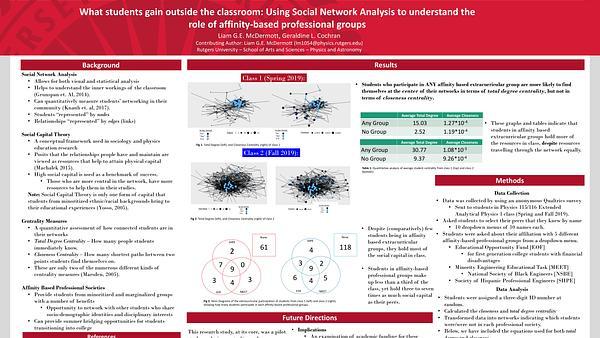Would you like to see your presentation here, made available to a global audience of researchers?
Add your own presentation or have us affordably record your next conference.
keywords:
higher education
identity
equity
Current rhetoric positions higher education as a key institution for individuals’ social mobility and economic success and as remedy for injustice. But, central to higher education are issues of access and equity that must be excavated for the institution to truly become a change agent. The truth of what college “is” must be analyzed from both etic and emic perspectives to be understood as constructed by society, as reflective of the lived experiences of those within it, and as the overlapping and contrasting realities of all of these. A quandary of what constitutes the identities in and of postsecondary education emerges. On one hand the state, as represented by policy makers, accrediting bodies, etc. focuses on neoliberal perspectives of accountability and producing a market product that will meet the goal of providing students with value for dollar. This process reduces what higher education is to a system of training for the job market (Canaan and Shumar, 2008). However, contingent on and contributing to the university’s legitimacy are the students and communities they serve. Anthropological studies have illuminated how spaces of possibility emerge within higher education that are reflective of social identities and justice (Brayboy, 2005; Tierney, 1993). These potentials for becoming, on the part of the faculty, student, and community, rely on higher education being an open and expansive field, not one narrowed by a perspective of accountability and governing by numbers (Shore & Wright 2015). Nevertheless, these identities are being commodified by institutions as an attempt to “diversify” student populations and sell a neoliberal narrative. Thus student populations are increasingly diverse regarding ethnicity, language, abilities, gender, immigration status, and socioeconomic status (amongst others) (NCES, 2019). Hence, the identity of the institution has changed in part because the student population has changed and the identities of students within higher education have changed presumably because the institution has changed. But, to what extent are these identities congruent? To what extent are they repellent? Perhaps, how are they intersecting? Several tenets of this identity quandary are worth exploring. First, the identities in and of post-secondary institutions, and the forces influencing them, must be understood as lived experiences. Deep ethnographic research is needed to understand how the intersecting identities of post-secondary stakeholders (students, faculty, staff, administrators, community members) are experienced in higher education. Second, the positionality of higher education, and its ideological influences, need to be examined in relation to whether stakeholders can fully live their complex identities within the institution. Finally, a multifaceted comparison between society’s perspective of higher education’s identity, the perspective of the institution on its own identity, and the nuanced experiences of those who co-construct its cultural space is necessary to thoroughly understand the true identity of today’s post-secondary education. This purview of research seeks to capture a truthful assessment and critique of the current identities of and in post-secondary education, serving as a space for and of contemplative thought regarding what higher education is and could become.

